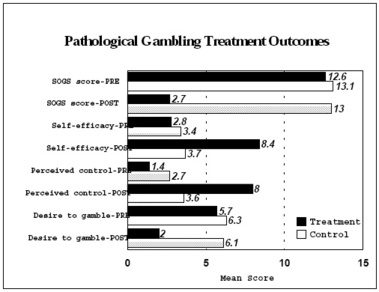The WAGER, Vol. 2(48) – Treating pathological gambling: A controlled study
While some treatments for pathological gambling are based on intuitive knowledge or modeled after substance abuse treatment, a few are based on empirical data that illuminates the psychology of gambling. A recent controlled study of a cognitive and behavioral treatment for pathological gambling was based on evidence that an inaccurate perception of the concept of randomness is the primary mistake made by gamblers .* According to the study’s authors, gamblers with this inaccurate perception of randomness develop a set of beliefs that they can control events governed by chance. These beliefs encourage them to pursue gambling despite the unpredictable nature of random events. The treatment intervention tested in this study included 1) cognitive correction (to correct misconceptions of the concept of randomness), 2) problem-solving training, 3) social skills training, and 4) relapse prevention. Forty gamblers meeting DSM-III-R criteria for pathological gambling were randomly assigned to the treatment or wait-list control group. Eleven subjects consequently dropped out, leaving 14 in the treatment group and 15 in the control group. Treatment outcomes were assessed with six measures at baseline, post-treatment, 6 months, and one year: 1) number of DSM-III-R criteria met, 2) score on the SOGS screen, 3) perception of control over their gambling problem, 4) desire to gamble, 5) self-efficacy perception, and 6) frequency of gambling. The treatment and control groups were comparable at baseline on all measures. At post-treatment, which was considered a maximum of 30 hours of individual treatment, participants in the treatment group met significantly fewer diagnostic criteria and had a significantly lower SOGS score, reported significantly less desire to gamble, and a significantly higher perception of control and self-efficacy. A measure of “clinically significantly change” confirmed that gamblers in the treatment group improved significantly more than those in the control group. At one-year follow-up, 89% of Pathological Gambling Treatment Outcomes the treatment participants were maintaining their therapeutic success and did not meet criteria for pathological gambling. The field of pathological gambling treatment needs more treatment outcome studies to be conducted with appropriate control groups. Since 36% of those assigned to the treatment condition in this study dropped out, researchers and clinicians are reminded to ensure that treatments for pathological gambling are attractive enough to enlist and sustain clients in the treatment protocol.
Source: *Sylvain, C., Ladouceur, R., & Boisvert, J-M. (1997). Cognitive and behavioral treatment of pathological gambling: A controlled study. Journal of Consulting and Clinical Psychology, 65(5), 727-732.
This public education project is funded, in part, by The Andrews Foundation.
